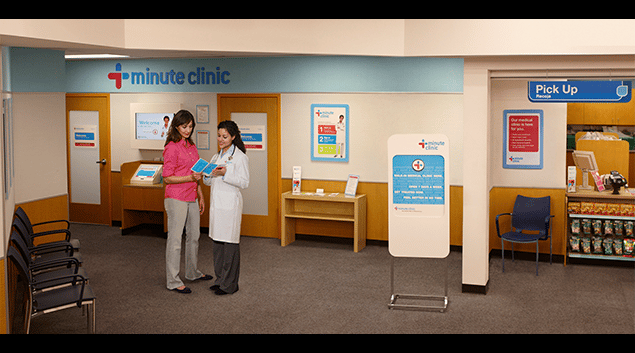
The recent approval of CVS Health’s merger with Aetna is being heralded as nothing less than potentially “transformational” to the health care system. Innovative ideas to streamline care and encourage cost effectiveness are not new. This is illustrated by the undefined collaboration between Amazon, Berkshire Hathaway and JP Morgan. Nevertheless here is the joining of the consumers, delivery and payer stakeholders. Observers have remarked on the impact that this union may have on the role of the MinuteClinic, i.e., the retail clinics owned and managed by CVS Health. Will there be incentives for Aetna member subscribers to favor these clinics over traditional practices? If so, will their service offerings need to further expand?
A relatively recent phenomenon (the first clinic was established in 2000), their use has been driven by convenience. Where else can you get a flu shot while picking up laundry detergent and cotton swabs or quickly get that sinusitis checked out without an appointment? Retail clinics have progressed significantly since their inception. For example, they were originally fee-for-service, but the majority of clinics now have negotiated contracts with major insurers.
While this sets up retail clinics as a go-to for wellness services and to manage simple acute illnesses, can they take it to the next level that being chronic disease management?
These contemplations have elicited the realization that retail clinics have not been on industry’s radar screen. To help get us up to speed and fully realize their potential in therapy development and commercialization, we provide five facts about retail clinics.
1. Retail clinics are staffed by non-physicians
The simple premise behind retail clinic management is filling the need for a convenient way to get non-critical acute illnesses such as influenza and sinusitis quickly, along with wellness measures like those pesky booster shots that we put off until the last minute. No appointment necessary. According to the National Urgent Care Center Accreditation (NUCCA), retail clinics are a level IV – the lowest level of care. In essence, requirements include that providers must be certified in basic life support, offer basic on-site lab but no radiology or suturing, and must post service limitations. Most noteworthy is how they are staffed. In accordance with level IV, retail clinics are staffed mainly by mid-level practitioners – vast majority being nurse practitioners – with remote medical supervision by a licensed physician. This makes sense as it is a less expensive option and an on-site physician would essentially be overkill.
2. Over 90% of retail clinics are managed by only five operators
The U.S. has approximately 2000 retail clinics. Five operators mainly represented by retail pharmacies followed by a supermarket and a big box store, run 92% of them. The remainder to a lesser extent, are run by physicians groups and delivery systems.
Location and Market Share of Retail Clinics by Chain, 2017
| Clinic Location | Clinic Operator | Market Share |
| CVS Health (retail pharmacy) | MinuteClinic | 55% |
| Walgreens | Walgreens Healthcare Clinic; Advocate | 18% |
| Kroger | The Little Clinic | 11% |
| Walmart | Care Clinic; Clinic at Walmart | 4% |
| Rite Aid | RediClinic | 3% |
| HEB | RediClinic | 2% |
| All others | 8% |
Adapted from Drug Channels.
According to the Center for Financial Research & Analysis, CVS Health is the largest operator of retail health care clinics in the U.S. As of December 2017, CVS Health operated over 1100 retail clinics in 33 states under the MinuteClinic name including 15 newly opened ones. Furthermore in 2015, CVS Health acquired Target’s pharmacy business, consisting of 1,660 locations and 80 in-store health clinics, for approximately $1.9 billion. The 79 clinics purchased were re-branded as MinuteClinic. CVS Health is working on opening 20 new clinics within Target stores by the end of 2018. Additionally, CVS Health and Target plan to develop five to 10 small-format stores over a two-year period following the close of the transaction.
3. Evolution from simple acute care and vaccines to chronic conditions is already taking place
There is already a movement by the retail clinic industry into the more complicated realm of chronic diseases. This wider scope of practice at certain retail clinics is facilitated through affiliation with larger health care systems which provide specialized physician oversight. Many clinics now care for and manage patients with chronic conditions, such as hypertension, diabetes, and asthma. For almost a decade, CVS Health has been affiliating with the Cleveland Clinic. Target (now CVS Health MinuteClinics) has recently struck up an agreement with Kaiser Permanente. Though these are currently regional partnerships, by way of the integration of the clinics into their system and thus physician engagement, they have allowed for improved access to and coordination of care. This is germane to monitoring in order to manage chronic conditions while maintaining links to other clinical systems.
4. Physicians groups may not necessarily be
fans of retail clinics expanding beyond
uncomplicated care and vaccines
While medical groups certainly see a role for retail clinics as they were originally intended, there is resistance against their expansion into areas such as chronic care. The American Academy of Family Physicians (AAFP) officially opposes the expansion of services offered by retail clinics, specifically those related to chronic disease management, as they fear fragmentation of care. They cite that the protocol-based decision and diagnostic models used in most retail clinics (they point out that they are non-physician led), may result in a missed opportunity to address more complex patient needs.
This view is bolstered in a 2017 article from the American Journal of Managed Care which cites that while there is strong user satisfaction demonstrated by a relatively high rate of return visits, people who use retail clinics are less likely to return to their primary physicians for subsequent visits. This raises continuity of care concerns.
There should be sensitivity toward the fact that retail clinics as viable competitors to physician practices, if services are greatly expanded to chronic disease monitoring and beyond.
5. Adults from millennials to seniors will likely
fuel growth
The retail clinic trend lends itself to convenience with expanded care options created through strategic collaborations. This is expected to stimulate interest in retail clinics by adults on both ends of the age spectrum – millennials and seniors. In fact, a recent article in Forbes notes that millennials are largely ditching their primary physicians and opting for real-time care provided on their schedules.
On the other end of the spectrum, retail clinics are taking steps to further focus their services toward seniors. Most notably, Walgreens “Take Care” clinics and Humana is piloting a program in Kansas City markets, targeted to Humana’s Medicare Advantage patients. Jointly, the two companies will offer geriatrics-focused acute and chronic care, health navigation services, and health education. Notably, retail clinics are already offering the free Medicare wellness visits.
The CVS Health-Aetna merger is being regarded as transformational for the health care industry as the clinic and payer are now one. This is as disruptive as it gets. CVS Health will now have the ability to convert more of its brick-and-mortar locations into front-line clinics for basic medical services and monitoring of chronic conditions. CVS Health has said that by deepening its knowledge of and relationships with patients, CVS says that the combination could help Americans stick with medication regimens and stay out of the hospital. This indeed makes sense as minute clinics are situated where people shop on a daily basis. and you can’t beat their proximity to pharmacists. This has the potential to increase a patient’s likelihood to actually fill their prescription and be more informed about it.
This may set the tone for other comparable non-traditional marriages. We are already seeing limited partnerships between Target’s MinuteClinics and Kaiser and Walgreens and Humana. If the model works, it is only going to grow. While industry has been doing a good job of connecting with patients, nurse practitioners and pharmacists, there is a huge opportunity to better engage them within the ecosystem of the retail clinic.
Snowfish has pioneered a unique approach of mapping the disease state ecosystem including non-traditional competitors and key stakeholder influencers designed to meet the needs of the particular product. To learn more, please feel free to contact us at info@snowfish.net..
- Market Access: The Latest Hurdle for Treating Alzheimer’s and Dementia - June 14, 2023
- Rare Disease Outreach a Missed Opportunity - November 7, 2022
- So You Read Our Previous Post on Biomarkers? - August 1, 2022



